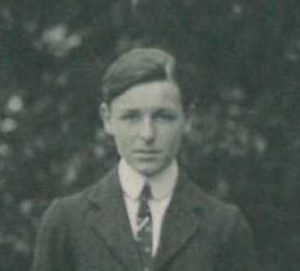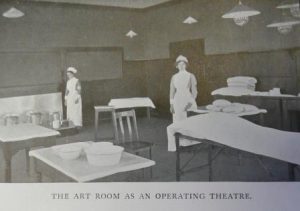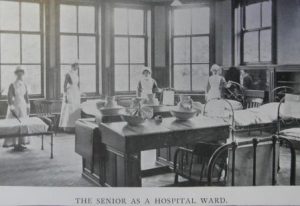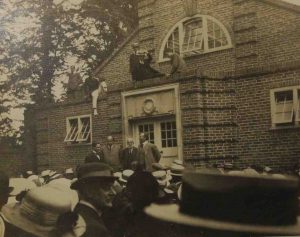In the December 1914 edition of ‘Bootham’ magazine, Ellen Rowntree (wife of Arthur Rowntree, Headmaster), described the events of the summer.
The summer term ended with its usual cheerful doings, picnics and examinations, triumphs of scholarships and swimming medals, river parties and cricket matches, and preparations for camp and holidays, with no suspicion of the great cloud hanging over us. Painters, carpenters, and charwomen were let loose upon the School, and the Head was finishing off the last of his papers, when the cloud burst over us and the shout of the war news rang down Bootham. We shared with the nation those first days of breathless tension and uncertainty, when all ordinary work and plans fell into the background and all that mattered was what should be done at once. This demand was speedily met for us as, consequent upon the rumour of a terrible disaster in the North Sea, the School was asked for as a hospital. Available members of the committee were consulted, and after hurried meetings with military and Red Cross authorities, the Headmaster arranged, greatly to their satisfaction, that fifty beds should be ready by noon next day on the ground floor of the school. Workmen were turned out, and a large body of willing helpers set to work to turn out cupboards and desks, sweep and scrub, beat mattresses on the masters’ grass, and carry beds down from the top landing. Old boys passing through from camp reversed waistcoats in time-honoured fashion and laboured with twice the zeal of packing-days. In a day the whole place was bare and spotless, the classrooms, gymnasium, and dining-room fully equipped wards. A continuous stream of motors brought medical extras, spare blankets, surgical furniture, county ladies, hard-worked officers and busy doctors to inspect and advise, and St. John Ambulance nurses, who made the beds, covered tables and desks with white oilcloth, set up charts, and arranged bandages and splints. The art room was transformed into an operating theatre. Gas was brought in through the window and well-protected sterilizers set up on the platform. Powerful lights were focussed over the operating-table in the centre, and in a corner stood a large sink with taps. The Reeves’ studies were for the use of nurses, and the masters’ common room was turned into a consulting-room. By degrees bedrooms, too, were made ready, and when we left for a fitful holiday Bootham was fully prepared for 106 patients. It was with mingled relief and disappointment that, as time went on, it was found unnecessary to retain the School as a hospital. The Government wished educational institutions to remain undisturbed, and as ample accommodation had been provided elsewhere for immediate needs the St. John Ambulance reluctantly withdrew and Bootham resumed its normal state. E. H. R.





